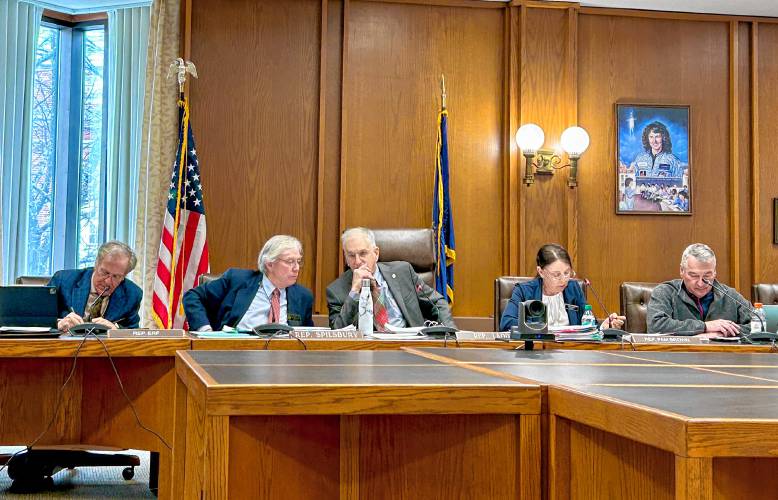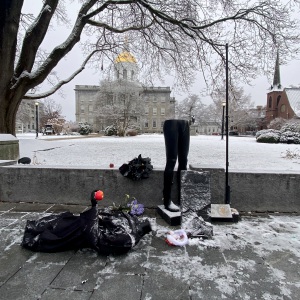House committee breaks with Gov. Ayotte in recommending fully universal education freedom account program

The House Education Funding committee on Tuesday recommended a bill that would make the state’s Education Freedom Account program open to all students. JEREMY MARGOLIS / Monitor staff
| Published: 03-04-2025 6:21 PM |
The Republican-controlled House Education Funding Committee on Tuesday endorsed a proposal to make New Hampshire’s school choice program fully universal starting in 2026.
The committee’s party-line vote represented a split from Governor Kelly Ayotte, who proposed last month limiting the expansion to students who chose to leaving public schools.
The distinction is significant: In 2024, only 32% of newly-participating students had exited public school immediately prior to enrolling in the program, according to data from the Department of Education.
Republican Rep. Rick Ladd, the chair of the committee, said requiring a child to start in public school before becoming eligible for EFAs would be “very disruptive.”
“I think it’s very difficult for families to say I’m going to have put my child in [public school] for one year even though I want my child in the EFA program,” said in an interview following the vote. “The child then has to go through and make friends at one school, then leave those friends and go to another program.”
A spokesperson for Ayotte did not immediately respond to a request for comment.
The committee amended the bill, HB 115, to delay the shift to a fully universal program by one year, opting instead to propose increasing the eligibility threshold from 350% of federal poverty guidelines to 400% for the 2025-26 school year. That increase would mean a family of four could qualify with an income of up to $128,600, up from the current maximum of $112,525.
Committee members were vehemently divided on the cost to the state of a fully universal program. Democratic Rep. David Luneau ocited a $102 million estimate from the organization Reaching Higher, while Rep. Ladd cited an $11 estimate prepared by the organization The Josiah Bartlett Center.
Article continues after...
Yesterday's Most Read Articles
 Police: Cache of drugs, gun seized in search
Police: Cache of drugs, gun seized in search
 ‘Like my child had died’: For parents trying to help their kids, New Hampshire’s mental health system forces a hard decision
‘Like my child had died’: For parents trying to help their kids, New Hampshire’s mental health system forces a hard decision
 Blasting set at Swenson Granite quarry, which may resume full operations this summer
Blasting set at Swenson Granite quarry, which may resume full operations this summer
 House committee defunds relief program for mothers and children, spares SNAP incentives
House committee defunds relief program for mothers and children, spares SNAP incentives
 Three arrested in connection with vandalism of Satanic Temple holiday display
Three arrested in connection with vandalism of Satanic Temple holiday display
 Zach Emerson, a cross-country innovator leaving a lasting impact on Hopkinton
Zach Emerson, a cross-country innovator leaving a lasting impact on Hopkinton
A previous Monitor review of the assumptions behind both of those estimates found that each had its flaws.
This year, the state is spending $27.7 million on the program.
Ayotte’s proposal – which would require that a child be “full-time enrolled” in a public school for the entire preceding academic year prior to becoming eligibel – would cost $44.1 million, she estimated.
When the program began in 2021, it was limited to families who made up to 300% of the federal poverty guidelines. Lawmakers increased that cap to the current 350% threshold in 2023, but they rejected an effort to increase it further to 500% last year.
Ladd said that when the program was first created in 2021, he considered a program that would require public school attendance as an element of eligibility.
“From a policy perspective and what’s educationally the best way to do this for kids, it was not that way,” he said.
Democratic members of the committee sounded the alarm on the prospect of a fully universal program.
“We’re now saying that it is okay to give these stipends to wealthy families whose children will go to these schools regardless of whether they got the stipend or not,” Rep. Hope Damon, a Sunapee Democrat.







 Henniker ponders what is a ‘need’ and what is a ‘want’
Henniker ponders what is a ‘need’ and what is a ‘want’ Boscawen residents vote to fund major renovation of public works building
Boscawen residents vote to fund major renovation of public works building ‘Voting our wallets’: Loudon residents vote overwhelmingly against $1.7M bond for new fire truck
‘Voting our wallets’: Loudon residents vote overwhelmingly against $1.7M bond for new fire truck In Pembroke, Education Freedom Accounts draw debate, voters pass budget
In Pembroke, Education Freedom Accounts draw debate, voters pass budget
